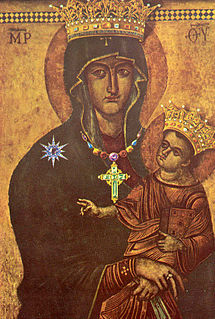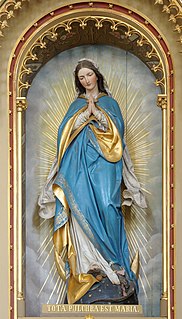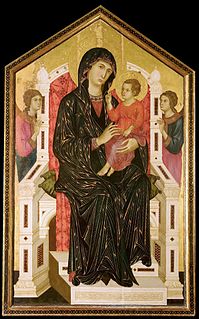
Pope Pius XII, born Eugenio Maria Giuseppe Giovanni Pacelli, was head of the Catholic Church and sovereign of the Vatican City State from 2 March 1939 until his death in 1958. Before his election to the papacy, he served as secretary of the Department of Extraordinary Ecclesiastical Affairs, papal nuncio to Germany, and Cardinal Secretary of State, in which capacity he worked to conclude treaties with European and Latin American nations, such as the Reichskonkordat with Nazi Germany.
In Christianity, inculturation is the adaptation of Christian teachings and practices to cultures. This is a term that is generally used by Catholics, whereas Protestants, especially associated with the World Council of Churches, prefer to use the term "contextual theology".

Summi Pontificatus is an encyclical of Pope Pius XII published on 20 October 1939. The encyclical is subtitled "on the unity of human society". It was the first encyclical of Pius XII and was seen as setting "a tone" for his papacy. It critiques major errors at the time, such as ideologies of racism, cultural superiority and the totalitarian state. It also sets the theological framework for future encyclical letters, such as Mystici corporis Christi (1943). The encyclical laments the destruction of Poland, denounces the Molotov-Ribbentrop Pact, and calls for a restoration of independent Poland.

Thomas Tien Ken-sin, SVD was a Chinese Cardinal of the Catholic Church and chair of Fu Jen Catholic University. He served as Archbishop of Peking from 1946 until his death, and was elevated to the cardinalate in 1946 by Pope Pius XII.
Pope Pius XII and the Church in China involves relations of the Holy See with China from 1939 to 1958. The Vatican recognized Chinese rites in 1939, elevated the first Chinese cardinal in 1946, and established a Chinese hierarchy.
Ad Apostolorum principis is an encyclical of Pope Pius XII on Communism and the Church in China. It describes systematic persecutions of bishops, priests, religious and faithful and the attempts of the government to establish a patriotic Catholic Church, independent of Rome.
Evangelii praecones was an encyclical letter of Pope Pius XII about Catholic missions. In it, he described necessary improvements and changes, and the persecution of the Church in some parts of the world. The encyclical was issued in commemoration of the 25th anniversary of the encyclical Rerum ecclesiae by his predecessor Pope Pius XI.
Cupimus imprimis is an apostolic letter of Pope Pius XII to all the faithful in China regarding their persecutions and the persecution of the Catholic Church.
Invicti athletae is an encyclical of Pope Pius XII to the bishops of the world on the 300th anniversary of the martyrdom of Saint Andrew Bobola.
Pope Pius XII and Russia describes relations of the Vatican with the Soviet Union, Russia, the Eastern Orthodox Church, and the Eastern Catholic Churches resulting in the eradication of the Church in most parts of the Soviet Union during the Stalinist era. Most persecutions of the Church occurred during the pontificate of Pope Pius XII.
Persecutions against the Catholic Church took place during the papacy of Pope Pius XII (1939-1958). Pius' reign coincided with World War II (1939-1945), followed by the commencement of the Cold War and the accelerating European decolonisation. During his papacy, the Catholic Church faced persecution under Fascist and Communist governments.

Ad Caeli Reginam is an encyclical of Pope Pius XII, given at Rome, from St. Peter's Basilica, on the feast of the Maternity of the Blessed Virgin Mary, the eleventh day of October, 1954, in the sixteenth year of his Pontificate. The encyclical is an important element of the Mariology of Pope Pius XII. It established the feast Queenship of Mary.

Fulgens corona is an encyclical by Pope Pius XII, given at St. Peter's, Rome, on 8 September 1953, the Feast of the Nativity of the Blessed Virgin Mary, in the fifteenth year of his Pontificate. The encyclical proclaims a Marian year for 1954, to commemorate the centenary of the definition of the dogma of the Immaculate Conception of the Virgin Mary.

The theology of Pope Pius XII is reflected in his forty-one encyclicals, as well as speeches and nearly 1000 messages, during his almost 20-year pontificate. The encyclicals Mystici corporis and Mediator Dei advanced the understanding of membership and participation in the Catholic Church. The encyclical Divino afflante Spiritu began opening the door to historical-critical biblical studies. But his magisterium was far larger and is difficult to summarize. In numerous speeches Catholic teaching is related to various aspects of life, education, medicine, politics, war and peace, the life of saints, Mary, the mother of God, things eternal and temporal.

The Mariology of the popes is the theological study of the influence that the popes have had on the development, formulation and transformation of the Roman Catholic Church's doctrines and devotions relating to the Blessed Virgin Mary.

A dogma of the Catholic Church is defined as "a truth revealed by God, which the magisterium of the Church declared as binding." The Catechism of the Catholic Church states:
The Church's Magisterium asserts that it exercises the authority it holds from Christ to the fullest extent when it defines dogmas, that is, when it proposes, in a form obliging Catholics to an irrevocable adherence of faith, truths contained in divine Revelation or also when it proposes, in a definitive way, truths having a necessary connection with these.

Mariological papal documents have been a major force that has shaped Roman Catholic Mariology over the centuries. Mariology is developed by theologians on the basis not only of Scripture and Tradition but also of the sensus fidei of the faithful as a whole, "from the bishops to the last of the faithful", and papal documents have recorded those developments, defining Marian dogmas, spreading doctrines and encouraging devotions within the Catholic Church.

Le pèlerinage de Lourdes is the only encyclical of Pope Pius XII issued in French. It includes warnings against materialism on the centenary of the apparitions at Lourdes. It was given at Rome, from St. Peter's Basilica, on the feast of the Visitation of the Most Holy Virgin, July 2, 1957, the nineteenth year of his pontificate.
Eastern Catholic victims of Soviet persecutions include bishops and others among the tens of thousands of victims of Soviet persecutions from 1918 to approximately 1980, under the state ideology of Marxist–Leninist atheism.









